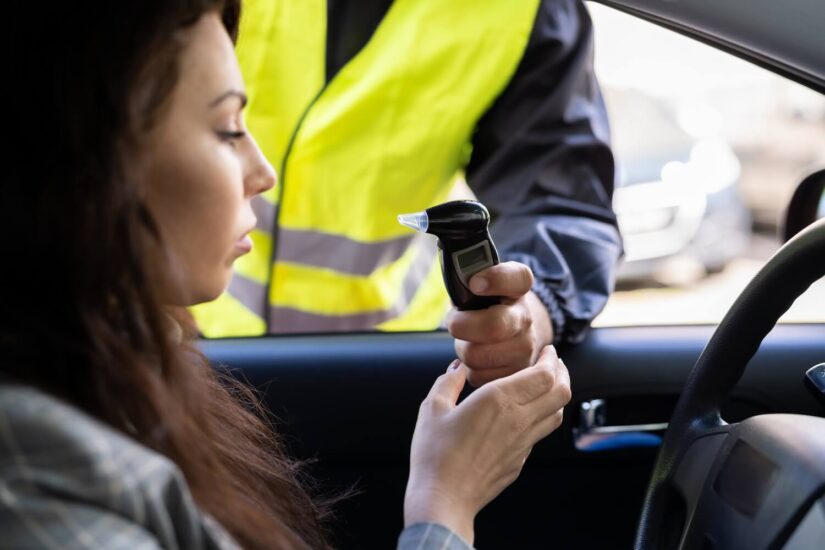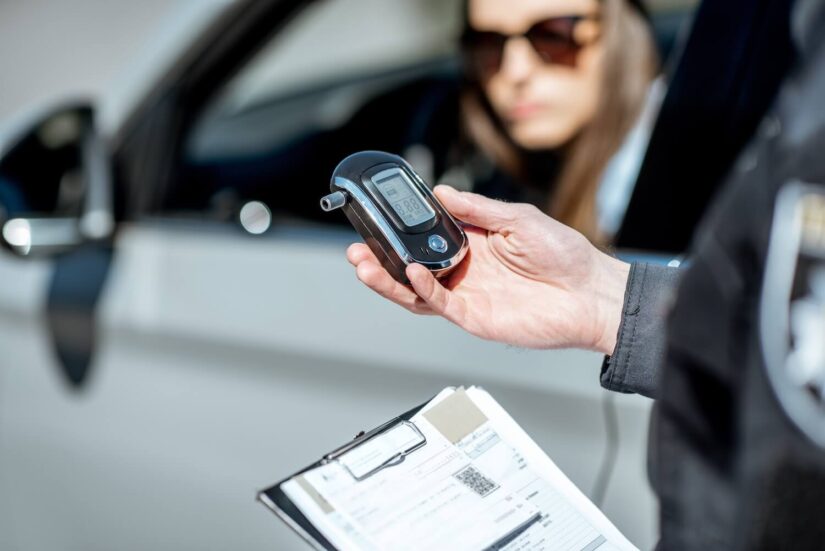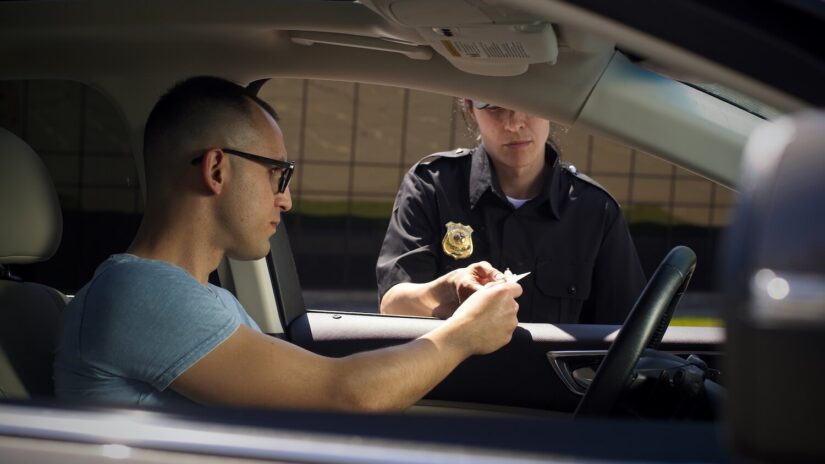
June 26, 2025
If you’re stopped for suspected DWI in Texas, you can refuse a breathalyzer test, but it comes with serious consequences. Texas has “implied consent” laws, meaning by driving, you’ve already agreed to take a chemical test if law enforcement suspects you’re intoxicated. Here’s what happens if you refuse:
- License Suspension: Automatic 180-day suspension for first refusal; up to 2 years for repeat refusals within 10 years.
- Court Evidence: Refusal can be used against you as evidence of guilt.
- Blood Test Warrant: Officers can still obtain a warrant to conduct a blood test.
- Harsher Penalties: Refusal often leads to stricter penalties than failing the test.
Quick Overview
| Action | Consequence |
| Refuse breathalyzer | 180-day license suspension (1st offense); up to 2 years for repeat offenses. |
| Refuse + prior offenses | Longer suspensions, harsher penalties, and possible blood test with a warrant. |
| Take the test (BAC < 0.08) | May avoid DWI conviction but still subject to officer’s observations. |
Refusing doesn’t mean avoiding charges – it may complicate your case. Always weigh the risks and consult a legal expert if you’re facing DWI charges.
Texas Implied Consent Laws Explained
In Texas, if you’re arrested on suspicion of driving while intoxicated (DWI), you’re required by law to submit to alcohol testing. Refusing to comply triggers immediate penalties.
What Implied Consent Means
By driving in Texas, you automatically agree to alcohol testing if you’re arrested for suspicion of DWI. This “implied consent” applies to breath, blood, and urine tests, with the arresting officer deciding which test will be conducted. Typically, officers use a breathalyzer for testing, though in some situations, they may opt for a blood test instead.
It’s important to note that implied consent only comes into play after a lawful DWI arrest. This means the officer must have probable cause to believe you’re impaired and formally place you under arrest before you’re required to submit to testing.
Your Right to Refuse Testing
Although Texas law presumes your consent, you still have the legal right to refuse a breathalyzer test. However, refusing comes with immediate and serious consequences.
By refusing, you’re essentially violating the agreement you made by choosing to drive. This triggers both administrative and criminal repercussions. On the administrative side, your license will be automatically suspended under the Administrative License Revocation (ALR) program, regardless of whether you’re later convicted of DWI.
On the criminal side, refusal doesn’t necessarily stop the testing process – officers can obtain a warrant to conduct a blood test, especially in cases involving accidents, injuries, or prior DWI offenses. Additionally, your refusal can be introduced as evidence against you in court.
Knowing how these laws work is critical, as they directly impact the choices you make during a DWI stop. Understanding the consequences of refusal helps clarify the risks involved in such situations.
Penalties for Refusing a Breathalyzer
Refusing a breathalyzer test in Texas carries immediate and automatic consequences, impacting both your driving privileges and your legal defense.
Automatic License Suspension (ALR)
If you refuse a breathalyzer, the arresting officer will immediately confiscate your driver’s license and issue a written notice of suspension. In exchange, you’ll receive a temporary driving permit.

Under Texas’s Administrative License Revocation (ALR) program, your license is automatically suspended regardless of whether you’re ultimately convicted. The suspension period depends on your prior refusal history. For a first-time refusal, the suspension period is usually 180 days. If you refuse again within a 10-year window, the suspension can extend up to two years. Additionally, if you’ve had prior alcohol- or drug-related enforcement contacts within the last decade, the suspension period may also reach two years.
To challenge the suspension, you must request an ALR hearing within 15 days of your arrest. Missing this deadline forfeits your right to contest the suspension.
Refusing the test doesn’t just stop at license suspension—it can also complicate your criminal defense.
How Refusal Affects Your DWI Case
Prosecutors often use a refusal as evidence to argue that you were aware of your guilt. Often, authorities can obtain a warrant to conduct a blood test anyway, adding further challenges to your defense.
By refusing, you lose the opportunity to use a potentially favorable BAC result in court. In fact, the penalties for refusing a breathalyzer are often harsher than those for failing the test, including steeper fines and longer suspension periods. If you’re on probation, refusing the test could lead to probation revocation, which might reinstate your original sentence, including possible jail time.
A DWI conviction stays on your driving record permanently, which can have long-term effects on your job prospects, insurance costs, and personal reputation.
Should You Refuse a Breathalyzer Test?
Deciding whether to refuse a breathalyzer test during a DWI stop is no small matter. While Texas law gives you the option to refuse, doing so comes with serious consequences that can impact you well beyond the initial encounter. Knowing the potential outcomes can help you make a more informed decision.
Weighing the Pros and Cons
The choice to take or refuse the test involves trade-offs, each with its own set of risks and implications.
| Aspect | Taking the Test | Refusing the Test |
| License Suspension | Depends on BAC result | 180 days for first refusal; up to 2 years for repeat offenses |
| Evidence Against You | BAC reading used in court | Refusal may be presented as evidence of guilt |
| Prosecution Strategy | Focuses on BAC level | May argue refusal shows “consciousness of guilt” |
| Additional Testing | Typically not required | Officers can seek a warrant for a blood test |
| Penalties if Convicted | Standard DWI penalties | Often harsher penalties than failing the test |
Refusing the test doesn’t mean avoiding consequences. Financially, the fallout can be steep. Beyond fines, you may be required to install an ignition interlock device, pay higher insurance premiums, and cover legal fees. Insurance providers often see refusal as a red flag, leading to long-term premium increases.
It’s also worth noting that law enforcement can still obtain a blood sample through a warrant, potentially strengthening their case against you.
Your Rights During a DWI Stop
Under Texas law, you have the right to refuse a breathalyzer test, but this decision activates automatic penalties. According to Texas Transportation Code 724.011, which outlines the state’s implied consent law, possessing a Texas driver’s license indicates that you have already consented to chemical testing if an officer has reasonable grounds to suspect intoxication.

Officers are required to explain the consequences of refusing the test, including the automatic suspension of your license. However, they are not obligated to advise you on whether refusal is in your best interest. Even if you decline the test, officers can still rely on other evidence – like field sobriety tests or their observations – to support a DWI charge. The National Highway Traffic Safety Administration has even identified over 100 driving behaviors that suggest a BAC of 0.08% or higher, giving officers plenty of tools to build their case.
Refusal doesn’t shield you from arrest or prosecution. Refusal may be seen as guilt, making your case harder to defend. On the other hand, compliance with a breath test often results in less severe penalties. If you’re confident that your BAC is under the legal limit of 0.08%, taking the test might actually strengthen your defense.
How The Napier Law Firm Can Help
Dealing with a DWI charge after refusing a breathalyzer test can feel overwhelming. The Napier Law Firm specializes in Texas DWI defense, offering aggressive legal representation paired with compassionate support. Here’s how their tailored defense strategies can help reduce the impact of a breathalyzer refusal.
DWI Defense Services
With former prosecutor George Napier leading the charge, the firm uses his insider knowledge to challenge prosecution tactics. They scrutinize traffic stops and verify the accuracy of warrant-obtained blood tests to ensure proper procedures were followed.
A key focus is on the Administrative License Suspension (ALR) process. The Napier Law Firm actively contests automatic license suspensions, questioning the legality of traffic stops during ALR hearings and reviewing breathalyzer maintenance records. They also assist clients in securing Occupational Driver’s Licenses (ODL), ensuring they can continue working and meet essential transportation needs even during a suspension.
George Napier’s accolades, such as being named a “Rising Star” by Super Lawyers and ranking in The National Trial Lawyers Top 40 Under 40 from 2019 to 2020, highlight the firm’s dedication to its clients. Their 10.0 ratings on Avvo and Justia further reflect consistent client satisfaction.
Beyond strategic defense, The Napier Law Firm offers immediate, 24/7 support to guide clients through every stage of their case.
Free Consultations and 24/7 Support
Recognizing that DWI arrests don’t stick to business hours, The Napier Law Firm provides round-the-clock availability and free consultations. This ensures clients receive prompt assistance, which is critical given the tight deadlines for contesting license suspensions.
“At The Napier Law Firm, we offer compassionate, client-focused representation, recognizing that a DWI arrest occurs to people who made a mistake.”
Their comprehensive approach covers every element of DWI cases involving breathalyzer refusal. From the initial ALR hearing and criminal trial to post-suspension license reinstatement, the firm is there every step of the way. During free consultations, they explore options like plea bargains to minimize penalties, including reduced fees, probation, or treatment programs. Their in-depth understanding of local laws and law enforcement practices allows them to craft defense strategies tailored to each case.
The firm’s dedication to safeguarding clients’ rights ensures that law enforcement and courts are held accountable throughout the process. This is especially important in breathalyzer refusal cases, where the stakes are high, involving criminal consequences and extended license suspensions.
Conclusion
Understanding your rights when it comes to breathalyzer tests in Texas is essential for making informed choices during a DWI stop. While you do have the option to refuse a breathalyzer, doing so comes with serious consequences under Texas’s implied consent laws.
If you’ve refused a breathalyzer or are facing DWI charges, reach out to an experienced DWI defense lawyer right away to safeguard your rights.

FAQs
What happens if you refuse a breathalyzer test during a DWI stop in Texas?
Refusing a breathalyzer test in Texas comes with serious repercussions due to the state’s implied consent laws. If you choose not to comply, your driver’s license will face an automatic suspension—lasting at least 180 days for a first refusal and up to 2 years for subsequent refusals. This penalty applies regardless of whether you’re later charged with or convicted of a DWI.
On top of that, your refusal can be introduced as evidence in court, potentially bolstering the prosecution’s argument. Knowing your rights and understanding the legal and practical outcomes of this choice is crucial during a DWI stop.
What happens if I refuse a breathalyzer test in Texas?
Refusing a breathalyzer test in Texas comes with serious repercussions. Thanks to the state’s implied consent laws, anyone driving automatically agrees to chemical testing – like a breathalyzer – if lawfully arrested for a suspected DWI. Choosing not to comply can trigger an automatic driver’s license suspension. For a first-time refusal, this suspension typically lasts 180 days, but for repeat refusals, it can stretch up to two years.
Some might assume that refusing the test helps avoid providing evidence of their blood alcohol concentration (BAC). However, this can actually backfire. Prosecutors often use a refusal to suggest guilt, and it doesn’t mean you’ll escape penalties. In fact, refusing the test often leads to stricter administrative consequences, such as longer license suspensions, even if you’re not ultimately convicted of DWI.
If you’re pulled over, it’s essential to understand your rights and the potential legal and administrative fallout of refusing a breathalyzer test in Texas.
Can you challenge a license suspension after refusing a breathalyzer test in Texas?
Yes, you can fight the automatic license suspension that kicks in after refusing a breathalyzer test in Texas. The key is to request an Administrative License Revocation (ALR) hearing within 15 days of receiving the suspension notice. This hearing gives you the chance to challenge issues like whether the traffic stop, arrest, or refusal was lawful.
If you win at the hearing, the suspension could be lifted or shortened. But if you miss the 15-day window to request the hearing, the suspension will automatically go into effect. Acting quickly is crucial, and getting legal advice can make a big difference in handling this process.